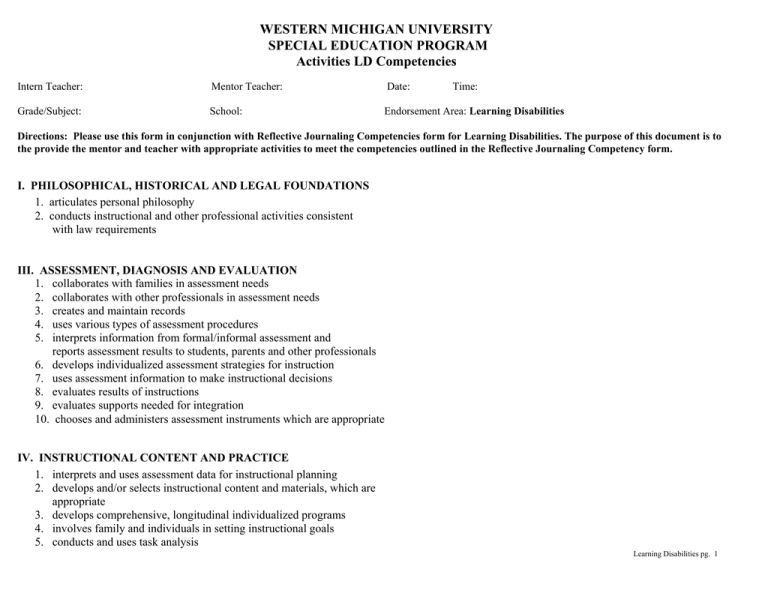WESTERN MICHIGAN UNIVERSITY SPECIAL EDUCATION PROGRAM Activities LD Competencies
advertisement

WESTERN MICHIGAN UNIVERSITY SPECIAL EDUCATION PROGRAM Activities LD Competencies Intern Teacher: Mentor Teacher: Date: Time: Grade/Subject: School: Endorsement Area: Learning Disabilities Directions: Please use this form in conjunction with Reflective Journaling Competencies form for Learning Disabilities. The purpose of this document is to the provide the mentor and teacher with appropriate activities to meet the competencies outlined in the Reflective Journaling Competency form. I. PHILOSOPHICAL, HISTORICAL AND LEGAL FOUNDATIONS 1. articulates personal philosophy 2. conducts instructional and other professional activities consistent with law requirements III. ASSESSMENT, DIAGNOSIS AND EVALUATION 1. collaborates with families in assessment needs 2. collaborates with other professionals in assessment needs 3. creates and maintain records 4. uses various types of assessment procedures 5. interprets information from formal/informal assessment and reports assessment results to students, parents and other professionals 6. develops individualized assessment strategies for instruction 7. uses assessment information to make instructional decisions 8. evaluates results of instructions 9. evaluates supports needed for integration 10. chooses and administers assessment instruments which are appropriate IV. INSTRUCTIONAL CONTENT AND PRACTICE 1. interprets and uses assessment data for instructional planning 2. develops and/or selects instructional content and materials, which are appropriate 3. develops comprehensive, longitudinal individualized programs 4. involves family and individuals in setting instructional goals 5. conducts and uses task analysis Learning Disabilities pg. 1 6. selects, adapts and implements instructional strategies which are appropriate to learner 7. sequences, implements and evaluates individual learning objectives 8. integrates affective, social and career/vocational skills with academic curricula 9. uses cognitive strategies across learning environments 10. uses instructional time properly 11. teaches thinking, problem-solving and other cognitive strategies to individuals 12. chooses appropriate instructional techniques and promotes successful transitions 13. uses verbal and nonverbal communication techniques 14. establishes and maintains rapport with students 15. conducts self-evaluation 16. uses effective instructional strategies for basic skills 17. uses instructional strategies for applying various study skills to academic areas 18. uses skills to enhance thinking process and vocabulary development 19. uses appropriate reading method, spelling methods and instructional strategies 20. assists individuals in the prediction and detection of errors in oral and written language 21. uses appropriate handwriting methods and instructional strategies 22. uses decision criteria for when to teach manuscript versus cursive writing 23. uses appropriate math methods and instructional strategies 24. uses research-supported instructional strategies 25. modifies speed of presentation and uses organization cues 26. integrates appropriate teaching strategies and instructional approaches to provide effective instruction in academic and nonacademic areas VI. MANAGING STUDENT BEHAVIOR AND SOCIAL INTERACTION SKILLS 1. 2. 3. 4. 5. 6. 7. 8. 9. 10. 11. creates a safe, positive and supportive environment uses strategies for facilitating integration of students into other settings prepares and organizes material for daily lesson plans incorporates evaluation, planning and management procedures designs, structures and manages daily routines uses effective behavioral management techniques implements the least intensive intervention consistent with the needs of the individual modifies learning environment to manage inappropriate behavior identifies realistic expectations for personal and social behavior uses effective teaching procedures in social skills instruction Learning Disabilities pg. 2 12. 13. 14. 15. 16. demonstrates procedures to increase self-awareness and self control and self esteem prepares individuals to exhibit self enhancing behavior in response to societal attitudes and actions designs a learning environment for individuals that provides feedback from 17. peers and adults VIII. PROFESSIONAL AND ETHICAL PRACTICES 1. uses ethical practices for confidential communication 2. implements collaborative strategies 3. uses good communication skills with students and professionals 4. fosters respectful and beneficial relationships 5. encourages and assists families to become active participants 6. collaborates with general classroom teachers and other personnel 7. communicates with general teachers and other personnelcommitted to developing highest educational and quality of life of individual 8. positive regard for culture, religion, gender and sexual orientation of student 9. promotes a high level of competence and integrity 10. exercises objective professional judgment 11. demonstrates good oral and written skills 12. engages in professional activities 13. complies with local, state, provincial and federal monitoring 14. practices CEC Code of Ethics and other standard practices of profession Learning Disabilities pg. 3


